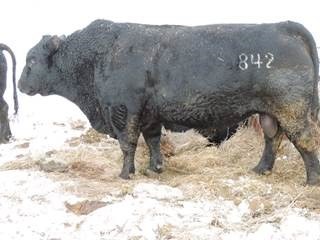Supplementing Bulls – minerals, vitamins, fats?
|
Bull fertility is impacted by a multitude of factors including: health, injury, But bull nutrition for high fertility is not just a function of energy status. It is also impacted by meeting the needs for a variety of minerals and vitamins that are known to have effects on spermatogenesis. Impacting seminal characteristics of concentration, morphology, and motility. In particular the region is known to produce feed marginal in zinc, copper, selenium, and others known to be directly related to fertility. Considering the costs of bulls and the economic importance of reproduction, a readily consumed quality mineral supplement should be considered essential.
|
Additionally there is antidotal acceptance some fatty acids and in particular omega-3 fat can be beneficial. Research done at Kansas State University using a flax based lick supplement was suggestive of a benefit when fed to yearling stage bulls. In a preliminary trial breeding soundness scores were improved but in a latter trail no differences were observed. The supplemented bulls however had better gains and feed utilization. When evaluating your supplementing options to get bulls ready for breeding, consider one developed to meet these needs.

 stress, genetics, and nutrition. Body condition is useful to reflect past and current nutrition. There are consequences for both underfeeding energy and over feeding and conditioning. Well grown young bulls reach puberty earlier than low gaining bulls. Fat bulls often have diminished semen quality as well as reduced soundness, stamina, and longevity. Over wintered mature bulls will likely re-flesh and condition on spring/early summer pasture prior to breeding turnout.
stress, genetics, and nutrition. Body condition is useful to reflect past and current nutrition. There are consequences for both underfeeding energy and over feeding and conditioning. Well grown young bulls reach puberty earlier than low gaining bulls. Fat bulls often have diminished semen quality as well as reduced soundness, stamina, and longevity. Over wintered mature bulls will likely re-flesh and condition on spring/early summer pasture prior to breeding turnout.